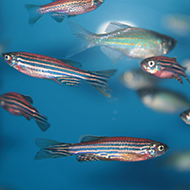Zebrafish insights could help humans reach Mars

Scientists found that torpor reduced the metabolic rate in zebrafish and created a radioprotective effect.
New insights into the zebrafish could help humans get to Mars by understanding how a type of hibernation, known as induced torpor, may protect against radiation.
Torpor is a reduced state of physical or mental activity in animals that protects them against harsh conditions, such as low temperatures and food shortages.
Scientists believe that reproducing torpor in humans could protect astronauts against the harsh conditions of space exploration, such as radiation exposure, bone and muscle wastage, vascular problems and advanced ageing.
“Recent technological advancements have made space travel more accessible, however, long-term space travel is incredibly detrimental to human health,” explained Professor Gary Hardiman, a researcher at Queen’s University Belfast and senior author of the paper.
“We set out to determine if induced torpor is a viable countermeasure to the harmful effects of spaceflight. If humans could replicate a similar model of hibernation we have observed in the zebrafish, it could increase our chances of making humans a spacefaring species.”
In the study, researchers exposed zebrafish to radiation similar to what would be experienced on a six-month mission to Mars. They noted that the radiation caused signs of oxidative stress, stress hormone signalling and halted the zebrafish cell cycle.
Next, the team induced torpor in a second group of zebrafish exposed to the same amount of radiation. The researchers analysed the gene expression patterns to examine the protective effects of this state on both physical and mental activity.
They found that torpor reduced the metabolic rate in zebrafiish and created a radioprotective effect, thereby protecting against the harmful effects of radiation. The findings are published in the journal MDPI Cells.
“Our results reveal that whilst in induced torpor, the zebrafish showed that a reduction in metabolism and oxygen concentration in cells promotes less oxidative stress and greater resistance to radiation,” said study co-first author Thomas Cahill.
"These insights into how a reduction in metabolic rate can offer protection from radiation exposure and could help humans achieve a similar kind of hibernation, counter measuring the damage they currently face during spaceflight.”



 RCVS Knowledge has welcomed Professor Peter Cockcroft as editor-in-chief for Veterinary Evidence.
RCVS Knowledge has welcomed Professor Peter Cockcroft as editor-in-chief for Veterinary Evidence.